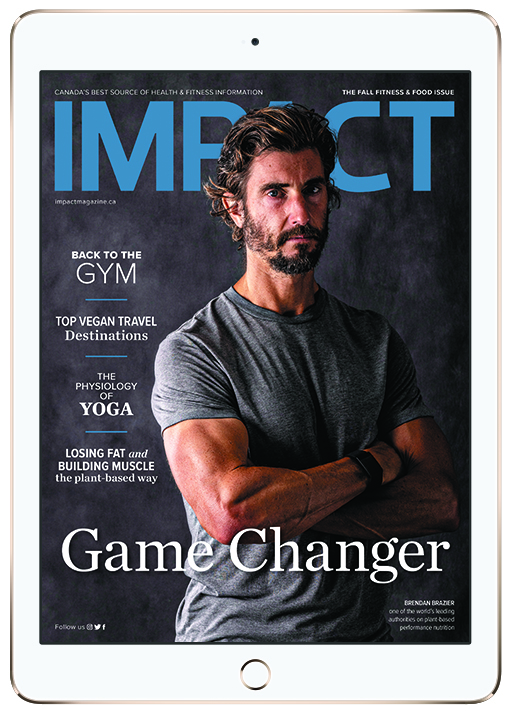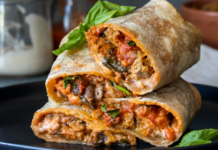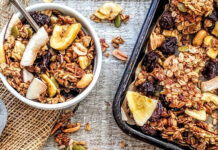
“It’s impossible to get enough protein to build muscle.” If you’ve ever thought this about a plant-based diet, you’re not alone—but you are wrong. As an athlete, to build muscle you need two things: consistent strength training and an adequate amount of protein.
The latter has been debated for decades with claims that it is impossible to replicate the complete animal-proteins with plant-based substitutes, but actually you can–it just takes more planning to get all nine essential amino acids. In conjunction with the rise in popularity of plant-based products, studies have shifted from overstating the downsides to being vegetarian or vegan, to finding its many health benefits. Elite athletes such as Venus Williams and Scott Jurek have proved that plant-based diets can improve performance and recovery.
Beyond your own health, dishing up plates full of plants will benefit the health of the environment. Global food production accounts for 35 per cent of all human-made greenhouse gas emissions (that’s almost 19 times the amount of carbon dioxide from the commercial aviation industry), according to a recent University of Illinois study. With animal-products producing twice the amount of emissions than planet-based ones, how you choose to fuel your body can move the needle for your own health and for the planet—without compromising your fitness goals.
Here are five tangible steps you can implement for a healthier you and a healthier planet.
- Embrace plants, not labels. If the world’s population were to become vegetarian by 2050, we could reduce food-relatedgreenhouse gas emissions by 60 per cent. “Aim for effort over perfection,” says Dr. Anita Vandyke, author of A Zero Waste Life. “Small steps can make a big cumulative difference. Rather than strictly adhering to any diet and labelling it a certain way, it’s best to just be consistent and do your best.” By opting for meatless meals (even if it’s just two days a week), we can reduce risk of heart disease, lower cholesterol, improve gut health and lower mortality rate. If you’ve been holding back for fear that you won’t get enough protein to ensure your gains, rest easy. In a 2022 review of 43 studies, researchers determined plant-based animal product alternatives are healthier than animal products, aiding in weight loss and muscle synthesis. And with the plant-based meat market valued at over $5 billion last year and expected to increase by 19 per cent by 2030, options are only going to continue to improve.
- Go (no) fish. A fresh filet may provide the essential Omega-3 fatty acids which aid heart health among a slew of other benefits, but there is a tiny problem with choosing fish as your main protein source: microplastics. Fifty-one trillion microplastic particles—more than 500 times the number of stars in the Milky Way—are in the sea and likely will make their way on to your plate. While only 0.03 per cent of ocean plastic comes from the now largely banned plastic straws, 10 per cent of all ocean plastic can be attributed to fishing gear from commercial fishing. A study that looked at the three commercially important wild fish from the north east Atlantic Ocean found that 49 per cent have microplastics in their system—32 per cent of which is found in the often-consumed dorsal muscle. By opting to get our omegas and lean protein from walnuts, flaxseeds or chia seeds, we can do our part in reducing the plastic in our bodies and our oceans.
- Eat for the season. Filling up half your plate with local, readily available fruits and vegetables helps reduce your carbon footprint in multiple ways. The transportation of food is responsible for six per cent of the world’s greenhouse gas emissions, according to a study published in the journal, Nature Food. Produce makes up the majority of these emissions due to the demand for out-of-season items and the refrigeration required to transport them. Eating seasonally helps you get the most nutritional value out of your produce and promotes a healthy microbiome due to a more varied diet. Also, a recent Australian study compared individuals who ate 230 grams of fruits and vegetables to those who consumed 470 grams or more. The individuals in the latter group had 10 per cent lower stress levels.
- Pass on plastic. By shopping the areas of the store with less packaging you’ll be doing both you and the planet a favour. Ultra-processed food (usually packaged in plastic) often contains sugar, artificial ingredients and trans fats that can lead to a plethora of health issues such as heart problems and obesity. Also, researchers found that individuals whose diets consist of more than 20 per cent of ultra-processed foods experience a 28 per cent faster global cognitive decline. When we stick to whole foods we can help reduce the plastic pollution of our aquatic ecosystems and our bodies—the average person ingests a credit card’s weight of microplastics each week, according to new findings by University of Newcastle. “Don’t beat yourself up when you realize that avoiding plastic altogether is virtually impossible,” says Lindura and Dr. Antonia Sappong, co-founders of Plastic Free Toronto. “Single-use plastic has become ubiquitous in our society, so celebrate your small wins and keep it moving.”
- Get creative in the kitchen. How many of your perishables well…perish before you get to them? The average Canadian household throws out 79 kilograms of food each year, according to a 2021 UN Environment Program report. When you go to the grocery store try reducing your shopping list by 30 per cent and check your kitchen stores before heading back to the aisles. When produce is starting to spoil, freeze it for smoothies or future stir fry’s. By getting creative with what’s in our fridge and cooking at home more, we can ensure food is seen as it truly is— a valuable resource for fueling a healthy body.
You May Also Like
Healthy Eating

Read This Story in Our 2022 Fall Fitness & Food Digital Edition
Featuring Brendan Brazier, athlete and pioneer in the plant-based sports nutrition industry. Trail Running 101 – plus this year’s Trail Running Shoe Review. Travel around the world to the top vegan-friendly destinations, recipes and much more!















